The Influences of Artificial Intelligence on Non-traditional learners in UK Higher Education: What are the evolving roles of Adult Educators?
Article Date | 17 September, 2025
By Olusola Leighe, Lecturer in Business, LSST Elephant & Castle; Dr Leanne Thi Thao Oanh Bach, Lecturer in Business and Module Leader, LSST Elephant & Castle; and Elise Mumbaga, Senior Lecturer/ Course Coordinator, LSST Luton.
Artificial intelligence (AI) is increasingly integrated into daily life and professional fields, including education, transforming traditional teaching methods and reshaping learning environments (Laupichler et al., 2022). In the United Kingdom, AI-powered educational technologies, such as adaptive learning systems, intelligent tutoring systems, and predictive analytics, are being embedded into university curricula, particularly at Imperial College and some nursing institutions, to personalise and enhance student learning experiences (Luckin et al., 2016). More importantly, the increasing use of AI in higher education necessitates changes in educator roles, particularly those supporting non-traditional learners (Danault, 2025).
Educators are now expected to develop new digital competencies, adapt their teaching strategies, and rethink pedagogical approaches to remain relevant and effective within an AI-integrated environment (Haoyang & Towne, 2025). However, a key problem is the limited understanding of how AI is reshaping the experiences of non-traditional learners and how adult educators in the UK are responding to these changes. Thus, this article will discuss how AI impacts UK non-traditional learners and the evolving responsibilities of adult educators.
Why do Non-Traditional Learners Matter?
Non-traditional learners often have diverse educational backgrounds, maybe returning to education after a break, and might study part-time or online. Adult learners, a significant subset of non-traditional learners, can particularly benefit from the personalised and flexible support (Storey and Wagner, 2024). However, traditional higher education systems have historically struggled to meet the diverse learning needs of these students (Bamber & Tett, 2010).
Concerning personalised and adaptive learning, AI has the potential to enhance learning experiences by tailoring them to the unique needs of adult learners (Danault, 2025; Al-Zahrani, 2024; Storey and Wagner, 2024). AI-driven technologies can create adaptive learning environments that respond to individual learners’ progress, offering customised support and moving beyond the traditional “one-size-fits-all” model (Beta, 2022; Al-Zahrani and Alasmari, 2024).
While research on educational technology and AI is expanding, most studies still focus on traditional learners and standard classrooms. There’s a noticeable gap when it comes to adult learners, whose educational journeys are often complex and non-linear. We know little about how AI can personalise learning for adults with diverse backgrounds, address digital literacy challenges, or reshape the roles of adult educators (Luckin et al., 2016; Holmes et al.,2019).
For our research, we gathered primary data using a mixed-methods approach, blending online questionnaires with semi-structured interviews. A total of 38 non-traditional adult learners and 34 educators from the London School of Science and Technology, based at the Luton and Elephant & Castle campuses, shared their insights with us.
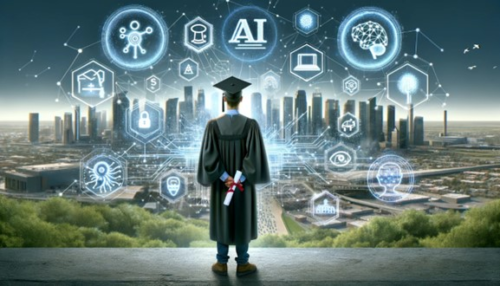
AI’s Positive Influence on Non-Traditional Learners in UK Higher Education
Enhanced Flexibility and Accessibility
- AI at their fingertips: 42% of non-traditional students use AI weekly or more, with nearly 68% saying it really helps them understand content. Students describe AI as an “always-available academic companion” that supports learning on their own schedule.
- Empowering flexible learning: Half of adult educators see AI boosting flexibility, accessibility, and engagement, helping learners juggle multiple responsibilities. Free and accessible, AI makes personalised, on-demand learning a reality.
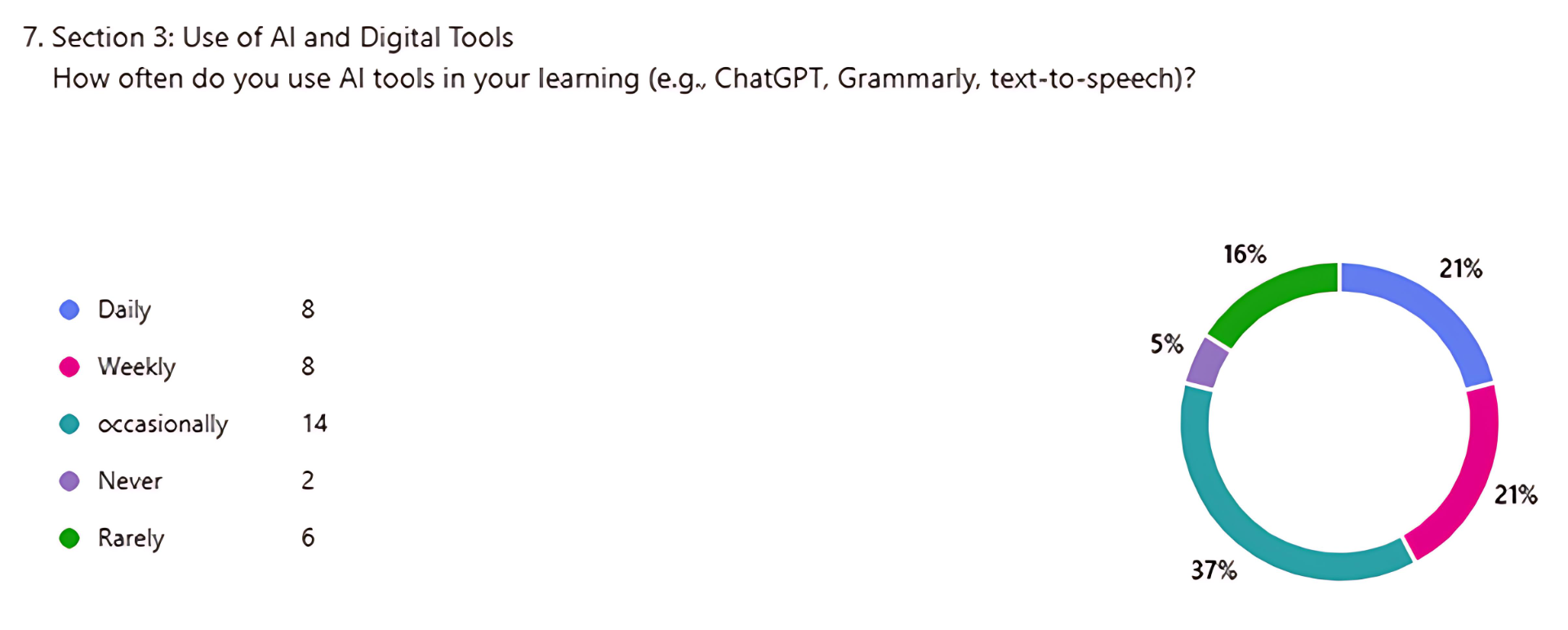
AI is shattering the constraints of time and location, transforming learning into an “on-demand” reality. AI is considered a catalyst for unparalleled flexibility, accessibility, and engagement, allowing learners to integrate education with their multifaceted lives seamlessly. This is not just flexibility; it’s the architectural redesign of learning around the individual’s life rhythm.
“AI has significantly enhanced accessibility and flexibility for non-traditional learners. Mature and part-time students benefit from AI tools that offer on-demand academic support, simplified explanations, and language assistance. These tools help them engage more confidently with coursework despite their external responsibilities.”
Mr Shan Wikoon, Senior Business Lecturer, LSST E&C
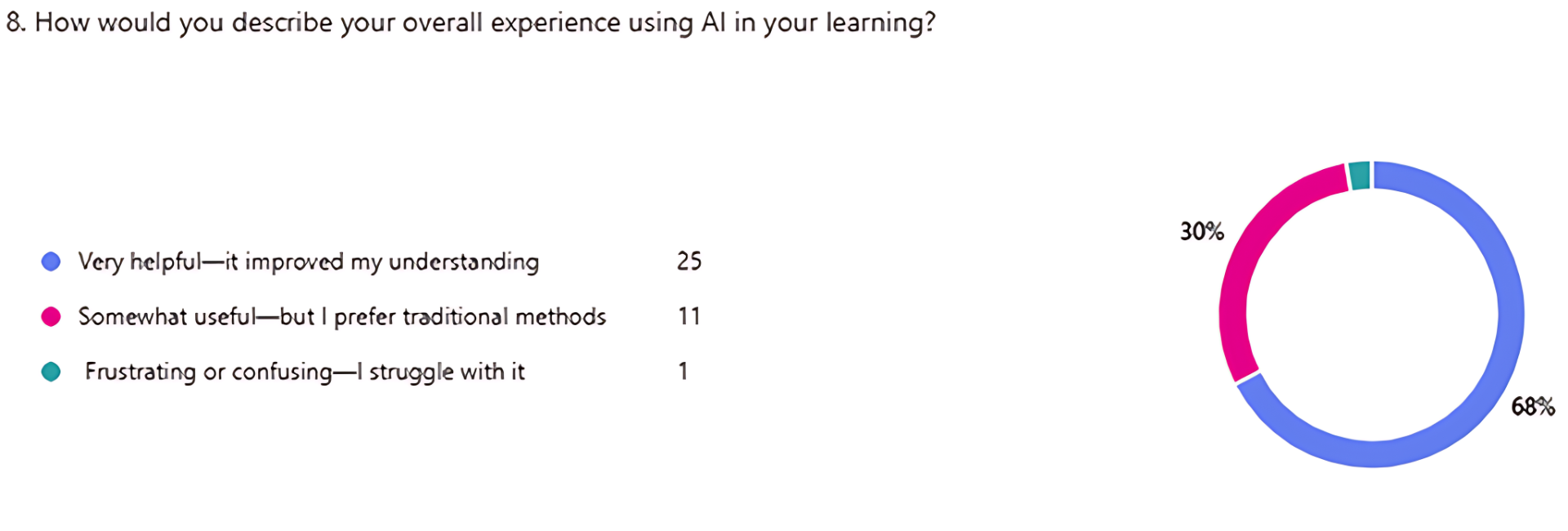
Personalised Learning Support
- Personalised learning in action: Nearly 62% of educators say AI boosts personalised learning, with one remarking that it “gives meaning based on how students prompt it.” For non-native English speakers, the benefits are clear; over half reported major improvements in language and writing.
- Tailored support for non-traditional learners: From instant explanations to simplified language, AI adapts to individual needs and learning styles. For mature students or those returning after a study break, this flexibility makes education more accessible and personal, echoing recent research on AI’s role in lifelong learning.
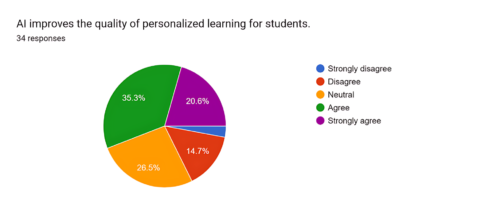
“I think overall AI presents a personalisation opportunity. When students use AI, they can get instant explanations tailored to their level of understanding. You know it will not only give them one meaning, but it will also give them the meaning as per how they prompt it.”
Dr. Rashi Basal, Lecturer/Course Coordinator, LSST E&C
Improvement in Academic and Communication Skills
- Boosting language and writing skills: Both students and educators pointed to AI’s value in polishing writing, grammar, and communication, with tools like Grammarly and Quillbot topping the list. Over half of non-native English speakers reported major gains in their writing and language development.
- More than just grammar checks: Beyond improving formal writing, AI is helping learners summarise complex content, spot plagiarism, and get instant feedback, building independence and critical thinking along the way.
“I could see in my students that AI tools help them improve writing skills and formal writing.”
Mr. Kamran Gohar, Trainee Lecturer, LSST E&C
Barriers for non-traditional learners in the AI-Integrated Learning Environment
- Barriers to adoption: Many non-traditional learners are still finding their footing with AI, about a third struggle to understand the tools, a quarter lack proper guidance, and nearly as many get no training at all. Educators face similar hurdles, with less than half feeling ready to support students in using AI effectively.
- Balancing benefits with risks: While AI can be a powerful ally, educators worry about over-reliance, in which 91% flagged concerns over academic integrity, plagiarism, and diminished critical thinking. The takeaway? Building AI literacy and setting clear boundaries is key to ensuring technology enhances, rather than undermines, learning.
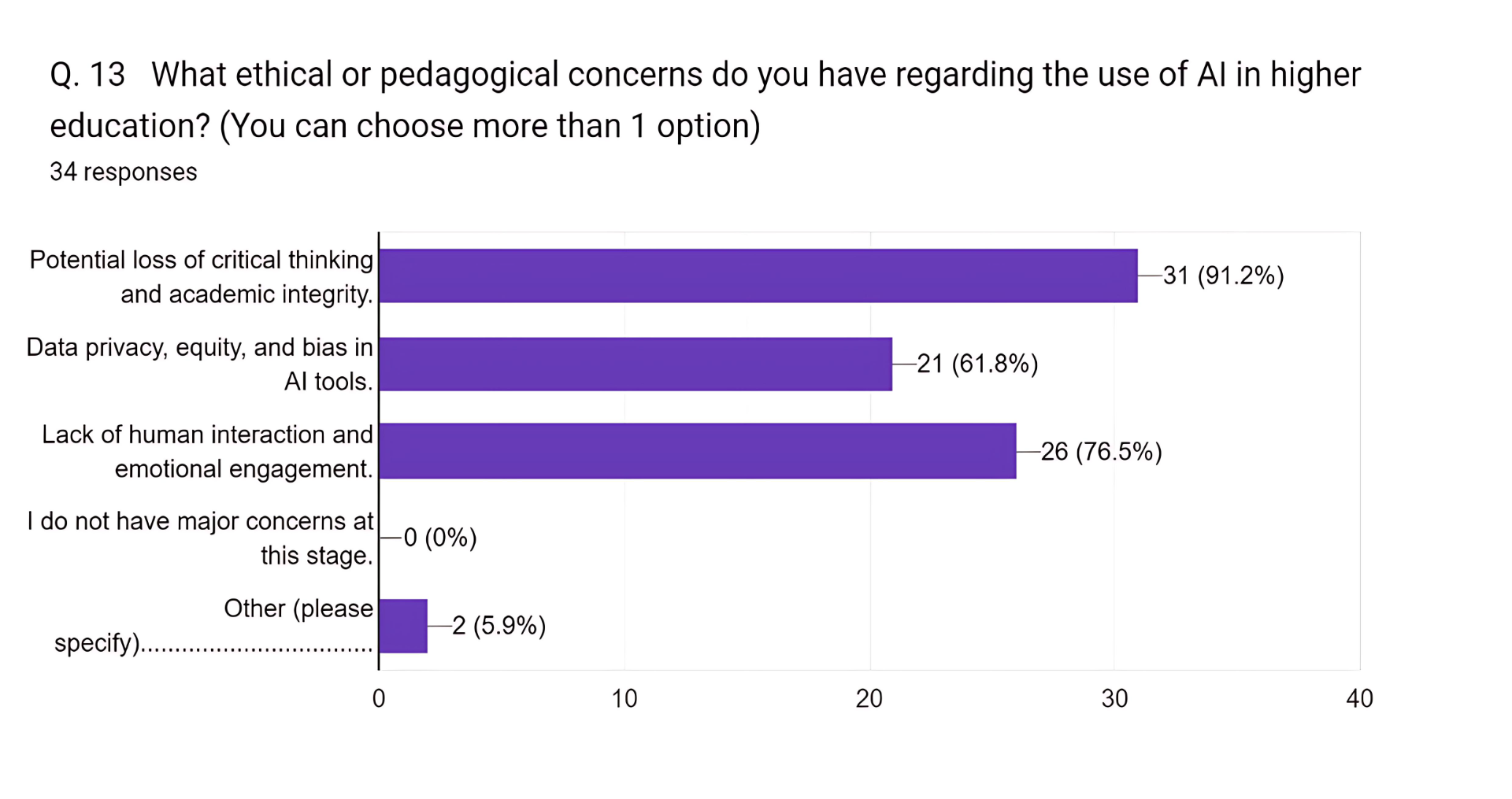
“I also have concerns around data privacy, mainly due to a lack of understanding about how our information is used. For example, it’s unclear whether our data might be collected without consent, which could impact both educators and students.”
Mrs. Reshma Nixon, Graduate Trainee Lecturer in Health, LSST E&C
Opportunities and Challenges for Adult educators in the AI-Integrated landscape
Adult educators are finding AI to be a real game-changer, boosting both efficiency and teaching quality. By saving time on lesson planning, updating materials, creating assessments, and enhancing feedback, AI helps teachers focus on what matters most, supporting learners (Mah & Groß, 2024; Hamilton & Swanston, 2024). Beyond efficiency, AI enables personalised teaching, allowing educators to tailor content and explanations to individual needs and learning styles, and even create “AI agents” for customised support. Research shows these capabilities help build adaptive, inclusive, and accessible learning environments in higher education (Owoc et al., 2021; Al-Zahrani & Alasmari, 2024).
However, many adult educators are hitting roadblocks when it comes to using AI in their teaching. Here are some major challenges:
- Struggling to keep up: With new AI tools popping up constantly, educators risk being left behind without clear guidelines or ongoing professional development.
- When AI writes too well – integrity under pressure: Educators face challenges in judging the authenticity and reliability of student work. 91% of educators are concerned that AI-generated content undermines critical thinking and slips past plagiarism checks, raising big questions about ethics, privacy, and transparency.
“The responses generated by ChatGPT are often perfectly written, which makes it difficult to know whether the content is genuine. If there’s no supporting evidence provided, it becomes challenging to question the validity or authenticity of the work”
Mr. Yunus Ali, Lecturer in Business, PAT Coordinator, LSST E&C
What are the Evolving Roles of Adult Educators?
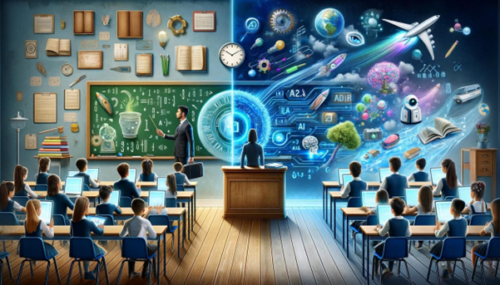
Around 41% of educators say their role is evolving from simply delivering content to mentoring and facilitating independent learning, guiding students to use AI critically and ethically (Takyar, 2025). Many also see teaching AI literacy, including ethical use, academic honesty, and understanding AI’s limits, as a key part of fostering responsible digital citizenship (Storey & Wagner, 2024; Danault, 2025). At the same time, educators acknowledge the need for ongoing upskilling and structured training to keep pace with AI, reinforcing calls for professional development grounded in frameworks like UNESCO’s AI Competency and TPACK (Ng et al., 2023; UNESCO, 2024).
From Strategy to Action: Integrating AI for Non-Traditional Learners
- Strengthen Educator Training and AI Competency Frameworks. Develop structured professional development programs that focus on the ethical and pedagogical integration of AI. Create institutional AI literacy benchmarks for teaching staff.
- Embed AI Literacy into Curricula for Non-Traditional Learners. Integrate training on AI use, digital ethics, and critical evaluation into first-year modules. Offer accessible workshops on popular AI tools.
- Establish clear guidelines for ethical AI use, data privacy, and academic integrity. Build governance structures to ensure AI implementation aligns with national priorities and best practices in higher education.
- The Department for Education should lead the creation of sector-wide frameworks that define responsible AI adoption in teaching and learning, ensuring alignment with pedagogical and ethical standards
Looking Ahead
Our research shows that AI can be a powerful ally for non-traditional learners, enabling flexibility, personalisation, and skill development. It also highlights that adult educators are already evolving, shifting from lecturers to mentors, guiding students not only in their subject matter but also in how to navigate an AI-driven world. To stay ahead in this rapidly evolving landscape, educators acknowledge the imperative for ongoing upskilling and structured professional development.
Yet this transition cannot rest solely on individual effort. Institutional support, sector-wide policies, and ongoing training are essential to ensure AI enhances rather than undermines education. AI is not here to replace educators. Instead, it is reshaping the ways we teach, learn, and connect. For non-traditional learners in particular, it offers a bridge to opportunity if we get the integration right.
—————————————–
For further discussion, please contact the authors via:
Dr Leanne Thi Thao Oanh Bach: Thi.bach@lsst.ac
Mr Olusola Leighe: Olusola.leigh@lsst.ac
Ms Elise Mumbanga: Elise.mumbanga@lsst.ac
References
Al-Zahrani, A.M. and Alasmari, T.M., (2024) Exploring the impact of artificial intelligence on higher education: The dynamics of ethical, social, and educational implications. Humanities and Social Sciences Communications, 11(1), pp.1-12.
Bamber, J. & Tett, L. (2010) ‘Transforming the learning experiences of non-traditional students: A perspective from higher education’, Studies in Continuing Education, 22(1), pp. 57–75. Available at: https://doi.org/10.1080/713695715 (Accessed: 4 September 2025).
Beta, K. (2022). The impact of artificial intelligence on students learning in higher education institutions in the UK. PhD thesis.
Danault, R.R., 2025. Adapting to AI: The Evolving Role of Faculty in Higher Education.
Al-Zahrani, A. M. (2024) From Traditionalism to Algorithms: Embracing Artificial Intelligence for Effective University Teaching and Learning. Educational Technology at IgMin 2(2):102–0112. https://doi.org/10.61927/igmin151
Hamilton, I. and Swanston, B., (2024) Artificial intelligence in education: Teachers’ opinions on AI in the classroom. Forbes. Available at: https://tinyurl.com/bddnth2b [Accessed 16 Apr. 2025]
Haoyang, D. L., & Towne, J. (2025). How AI and human teachers can collaborate to transform education. World Economic Forum. https://tinyurl.com/2jxjzmfd
Holmes, W., Bialik, M. and Fadel, C. (2019) Artificial Intelligence in Education: Promises and Implications for Teaching and Learning. Boston: Center for Curriculum Redesign
Laupichler, M.C., Aster, A., Schirch, J. and Raupach, T. (2022). Artificial Intelligence Literacy in Higher and Adult education: a Scoping Literature Review. Computers and Education: Artificial Intelligence, [online] 3, p.100101. doi:https://doi.org/10.1016/j.caeai.2022.100101.
Luckin, R., Holmes, W., Griffiths, M., & Forcier, L. B. (2016). Intelligence unleashed: An argument for AI in education. Pearson Education.
Mah, D.K. and Groß, N., (2024) Artificial intelligence in higher education: exploring faculty use, self-efficacy, distinct profiles, and professional development needs. International Journal of Educational Technology in Higher Education, 21(1), p.58.
Ng, D. T. K., Wu, W., Leung, J. K. L., Chiu, T. K. F., & Chu, S. K. W. (2023). Design and validation of the AI literacy questionnaire: The affective, behavioural, cognitive and ethical approach. British Journal of Educational Technology. https://doi.org/10.1111/ bjet.13411
Owoc, M. Sawicka, A. and Weichbroth, P. (2021) Artificial Intelligence Technologies in Education: Benefits, Challenges and Strategies of Implementation. [online] Ue.wroc.pl. Available at: http://www.ue.wroc.pl/en/. Accessed on [16/04/2025].
Storey, V.A. and Wagner, A., (2024) Integrating artificial intelligence (ai) into adult education: opportunities, challenges, and future directions. International Journal of Adult Education and Technology (IJAET), 15(1), pp.1-15.
Takyar, A. (2025). AI in education: Use cases, benefits, solution and implementation. LeewayHertz, A Hackett Group Company. https://tinyurl.com/52absat5
UNESCO (2024). AI competency framework for teachers. [online] Unesco.org. Available at: https://unesdoc.unesco.org/ark:/48223/pf0000391104 [Accessed 16 Apr. 2025].




